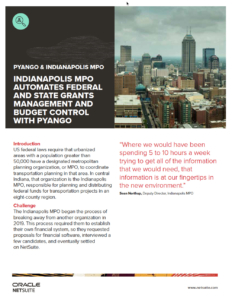Case Study: Indianapolis Metropolitan Planning Organization
Indianapolis MPO automates Federal and State Grants Management and Budget Control with PyanGo
By: Rich Uphus | January 9, 2023
Introduction
US federal laws require that urbanized areas with a population greater than 50,000 have a designated metropolitan planning organization, or MPO, to coordinate transportation planning in that area. In central Indiana, that organization is the Indianapolis MPO, responsible for planning and distributing federal funds for transportation projects in an eight-county region.
US federal laws require that urbanized areas with a population greater than 50,000 have a designated metropolitan planning organization, or MPO, to coordinate transportation planning in that area. In central Indiana, that organization is the Indianapolis MPO, responsible for planning and distributing federal funds for transportation projects in an eight-county region.
“Where we would have been spending 5 to 10 hours a week trying to get all of the information that we would need, that information is at our fingertips in the new environment.”
– Sean Northrup, Deputy Director, Indianapolis MPO
Challenge
The Indianapolis MPO began breaking away from another organization in 2019. This process required them to establish their financial system, so they requested proposals for financial software, interviewed a few candidates, and eventually settled on NetSuite.
The Indianapolis MPO began breaking away from another organization in 2019. This process required them to establish their financial system, so they requested proposals for financial software, interviewed a few candidates, and eventually settled on NetSuite.
According to Sean Northup, deputy director of the Indianapolis MPO, the organization was immediately pleased with what NetSuite had to offer. The most significant benefit, he says, is “just the ease of seeing our information. We built out reports and dashboards to answer the exact questions we need to answer.”
However, the complexity of their financial needs soon made it clear that they needed a way to supplement the NetSuite functionality. Northup explains, “All of our money that comes in is federal money; 80% of what we get is gas tax money that comes back from the federal government through the state. That money has to be spent with a local match attached to it. So all the money that comes in is 80% federal; we then collect local membership dues for the other 20%. And then all of our expenses go out 80% federal, 20% local.”
This, he explains, complicates the budgeting process: “We have to track both things: the local match and the federal money. We have to track the match down for each one of those. That’s an advanced capability.”
“We don’t spend nearly as much time digging through data. And that allows us to be much better stewards of the funding than we otherwise would be.”
– Sean Northrup, Deputy Director, Indianpolis MPO
Solution
Before NetSuite, Northup says, this was a long and arduous process for their CFO. “It was almost a manual process in some ways in our old system and would take weeks to complete,” he says.
Before NetSuite, Northup says, this was a long and arduous process for their CFO. “It was almost a manual process in some ways in our old system and would take weeks to complete,” he says.
Indeed, they thought, there was a way to streamline and speed up this process within NetSuite. So they began looking for a way to add that functionality to NetSuite.
They found the answer in PyanGo’s grant management module. With help from PyanGo and an implementation consultant, they got the functionality they required up and running. “It was a pretty clean process,” says Northup.
“We’re able to see when we submit a reimbursement, how much it’s for, and when that reimbursement actually paid out back into our bank account.”
– Sean Northrup, Deputy Director, Indianapolis MPO
Results
After his team had been trained on their new financial system, Northup quickly saw results: “I think our early big win was related to a fundamental question we always had: How much of our money is still out there that we need to contract against? So the first big, heavy lift for PyanGo was producing a report that said, ‘Here is exactly how much is on the grant, how much has been spent down on the grant, how much is encumbered that can’t be billed against, and how much needs to be contracted against.'”
After his team had been trained on their new financial system, Northup quickly saw results: “I think our early big win was related to a fundamental question we always had: How much of our money is still out there that we need to contract against? So the first big, heavy lift for PyanGo was producing a report that said, ‘Here is exactly how much is on the grant, how much has been spent down on the grant, how much is encumbered that can’t be billed against, and how much needs to be contracted against.'”
Mike Canniff, CEO of PyanGo, explains how PyanGo helps users with situations like this: “With PyanGo Automated Budgetary Control, we can alert users immediately when they’ve gone over budget or when they are about to over-encumber a grant. The benefit for Indianapolis MPO is when they receive federal grants, they’re required only to spend what is allowable on that grant and not go over what’s been allocated. Automated Budgetary Control ensures this won’t happen by providing real-time enforcement.”
In addition to budgetary control, Northup is pleased with how PyanGo ensures accurate reporting of Indianapolis MPO’s current financial situation: “With PyanGo, we now know exactly how much money we have in each grant so that we can make sure that we’re properly obligating funds.”
This gives users confidence in their numbers, says Narendra Phadke, principal partner and co-founder at PyanGo. Without this visibility, organizations can waste significant time: “They spend a lot of time trying to figure out how much they still have to remain. And sometimes, if they’re not able to do that, they tend to go over budget, which they then realize after the expense is made. Going over budget has consequences, so at times, they will have to reallocate their budget and move money from one bucket to the other. So it is very time-consuming; it’s a hassle. But with these numbers from PyanGo, they can confidently go ahead and make that purchase.”
Northup says that all of this gives his organization confidence that they are making the best use of the money they’ve been given: “We have a responsibility to taxpayers in central Indiana to know where the funds are and to responsibly apply them. We are operating with much more information than we ever had before. The biggest difference is that we can answer questions about funds instantly that would have taken hours before. Our level of confidence is significantly higher, and it allows us to be a lot more efficient. We don’t spend nearly as much time digging through data. And that allows us to be much better stewards of the funding.”
Better Reports
Before implementing the combined NetSuite and PyanGo solution, Northup’s team spent a lot of time generating reports. “It would take several days to get good reports and much Excel work,” he says. “A lot of exporting different reports, combining them within Excel, and then manually producing the reports. Much of the information we’re looking at now would have been very difficult and time-consuming, if not impossible, to generate if we were under a time crunch.”
Before implementing the combined NetSuite and PyanGo solution, Northup’s team spent a lot of time generating reports. “It would take several days to get good reports and much Excel work,” he says. “A lot of exporting different reports, combining them within Excel, and then manually producing the reports. Much of the information we’re looking at now would have been very difficult and time-consuming, if not impossible, to generate if we were under a time crunch.”
In addition, manually generating reports can result in errors: “There’s a proneness towards some small number of errors that happen as a result of manual work. Often it takes many hours to sort out where those errors took place and eradicate them from your reports to ensure that everything is being presented correctly.”
Checking the accuracy of reports took up a lot of their time, he recalls: “That was the whole job before: going through the reports and making sure that everything was billing to the right department, making sure we understood what all of the expenses were that we’re hitting and that we could explain each one of them, making sure things balanced out.”
With their new financial system, however, his team is saving hours of effort each week. “There’s so much more information available within the NetSuite and PyanGo environment than in our old solution,” he says. “Where we would have spent maybe 5 to 10 hours a week trying to get all of the information that we would need, that information is just there at our fingertips in the new environment.” For instance, for each grant, they can easily access data about all associated expenses, which streamlines the process. “So we can spend time ensuring it’s classified right, hitting the right accounts, cashing checks, and sending invoices.” This is helped by the fact that PyanGo is built on the NetSuite platform, making centralized reports easier: all data and applications are always available and can be easily accessed.
Checking the reports’ accuracy is far less arduous than it used to be. Phadke, “I think the value is clear in that there is more accountability or traceability in those numbers; there’s more confidence in those numbers shown on the summary report. As a grant administrator, this provides more confidence because I know exactly how those numbers are being summed up in my summary report.”
Creating reports now takes less time than ever with their previous system. And this means money savings because it’s allowed them to grow without adding more staff. “We have completely replaced our CFO,” says Northup. “We’ve taken in-house all of the financial tasks that the internal financial team in Indianapolis once did, which was three people. So that’s been a complete replacement.”
Better Visibility
Before Indianapolis MPO became its organization and implemented the NetSuite/PyanGo solution, understanding their position related to grants was difficult. “We were waiting for our reimbursement checks to come back from the state to understand exactly where we stood on grants,” Northup recalls. “There was no way to track that under the
old system; all we would see was that the voucher had been submitted, and we would hope that it worked on the backend. An audit report would verify it at the end of the year.”
Before Indianapolis MPO became its organization and implemented the NetSuite/PyanGo solution, understanding their position related to grants was difficult. “We were waiting for our reimbursement checks to come back from the state to understand exactly where we stood on grants,” Northup recalls. “There was no way to track that under the
old system; all we would see was that the voucher had been submitted, and we would hope that it worked on the backend. An audit report would verify it at the end of the year.”
This led to errors and wasted time: “It was not uncommon, when we were part of the city’s organization, to have discrepancies between the voucher that went in and what came back that we would find later in the process,” says Northup. “We were always able to reconcile that between the city and the state, but it took much more investigative work then.”
PyanGo has made all the difference where that’s concerned: “Now we have all that information at the front end, which has made a huge difference.” With their new system, they have the necessary visibility to know where they stand with grants. “Now we understand where we are on the grants before we even encumber the expense. And then, the reimbursement becomes part of the process. It’s not a small detail for us, especially now that we’re out of the city organization and on our own as an independent organization with a smaller bank account than the enterprise city of Indianapolis. We can see when we submit a reimbursement, how much it’s for, and when that reimbursement is reimbursed and paid into our bank account.”
This has a few advantages, according to Phadke: “This improves an organization’s credibility in the eyes of its stakeholders when they can show these numbers to those stakeholders at any given point in time, and then support these numbers with the drill-down capability of the transactions behind these numbers.” PyanGo provides these numbers accurately and in real-time: “PyanGo is constantly showing an organization their expenses and revenue to date, in real-time. And it shows these numbers on a grant level, on a grant page. And that’s why users know exactly how much they have spent and how much they have remaining to spend.”
Better Systems
Northup has been happy with the NetSuite and PyanGo solution’s immediate improvements to his organization. Still, he’s also thinking of how future employees of the Indianapolis MPO will interact with the system.
Northup has been happy with the NetSuite and PyanGo solution’s immediate improvements to his organization. Still, he’s also thinking of how future employees of the Indianapolis MPO will interact with the system.
“When our board voted to become an independent agency, one of the things that we established as our internal litmus test was: are we building systems that we can hand off to somebody else? Are they turnkey? Are they ready to go, involving only minimal training and uptake to do the same things we’re doing?”
“Within our financial system, it’s become obvious and very straightforward what each one of the next steps is and what needs to be done,” he says. “I’m confident that if I left this job tomorrow, somebody could come in, on the NetSuite and financial management part of my job, and do all the tasks with minimal disruption.” And his experience with their new solution leads him to trust that this will be the case.
He explains why the Indianapolis MPO finds this important: “We’ve been trying to build structures that can outlive any of the staff that we have. We think that’s probably the ultimate test of how good the process and the structure are for our operations. Having clarity and predictability is key to ensuring that we can consistently deliver on tracking these funds and know exactly where funds are and how we plan for the next year.”
With the help of NetSuite and PyanGo, he concludes, “I think that on the accounting side of it, we’ve been able to achieve that.”
Click here to request a demo or arrange a no-obligation consultation with one of our experts.






